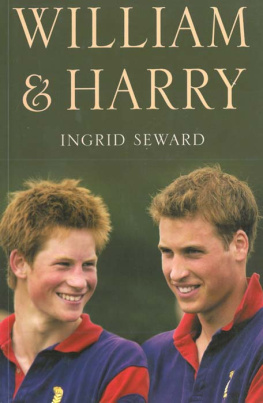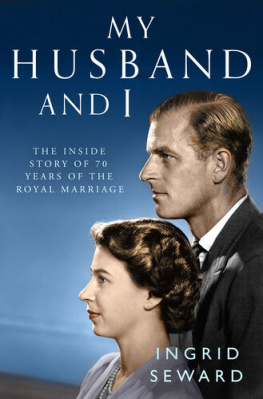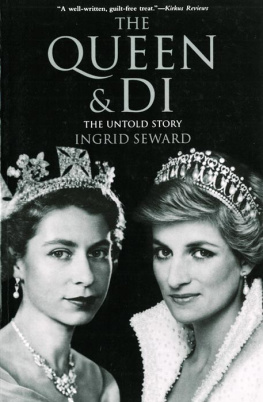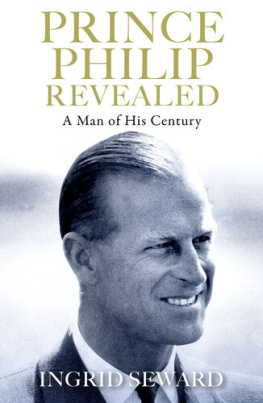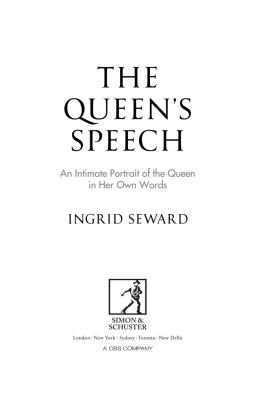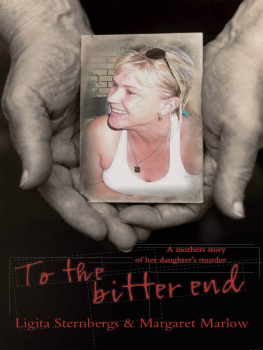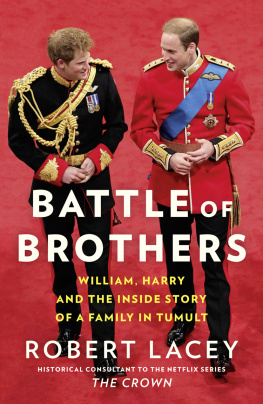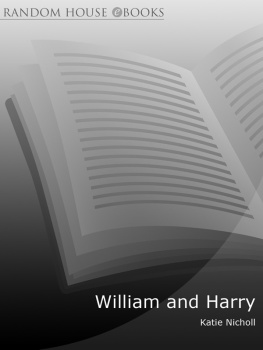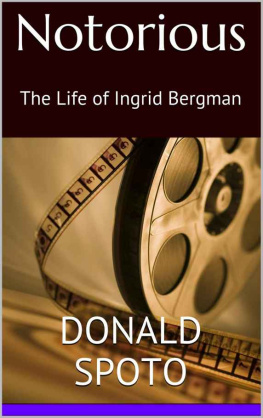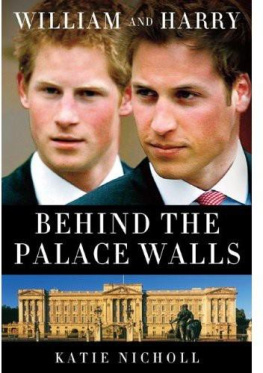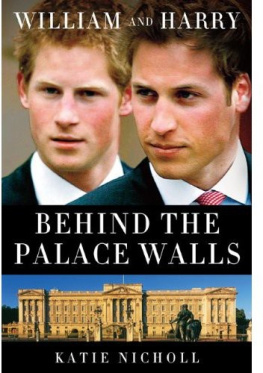
Copyright 2003, 2011 by Ingrid Seward
All Rights Reserved. No part of this book may be reproduced in any manner without the express written consent of the publisher, except in the case of brief excerpts in critical reviews or articles. All inquiries should be addressed to Arcade Publishing, 307 West 36th Street, 11th Floor, New York, NY 10018.
Arcade Publishing books may be purchased in bulk at special discounts for sales promotion, corporate gifts, fund-raising, or educational purposes. Special editions can also be created to specifications. For details, contact the Special Sales Department, Arcade Publishing, 307 West 36th Street, 11th Floor, New York, NY 10018 or arcade@skyhorsepublishing.com.
Arcade Publishing is a registered trademark of Skyhorse Publishing, Inc., a Delaware corporation.
First published in 2003 in Great Britain by Headline Book Publishing
Every effort has been made to fulfill requirements with regard to reproducing copyrighted material. The author and publisher will be glad to rectify any omissions at the earliest opportunity.
Visit our website at www.arcadepub.com.
10 9876543 2 1
Library of Congress Cataloging-in-Publication Data is available on file.
ISBN: 978-1-61145-593-9
Also by Ingrid Seward
Diana: Portrait of a Princess
Sarah, Duchess of York
Royal Children
Prince Edward
The Last Great Edwardian Lady:
The Life and Style of Queen Elizabeth the Queen Mother
The Queen and Di
With Unity Hall
By Royal Invitation
Royalty Revealed
To Chloe, Daisy and Charlie Bunn
and the memory of their late mother, Lorna
Introduction

R oyal princes are born, not elected. There is nothing democratic about their titles or position. These come from birth rather than ability.
That can be a weighty burden in an age when scepticism has replaced awe, the hereditary principle is being discarded in so many areas of public life, and the role of the Royal Family is under scrutiny as never before.
It is not a situation with which William and Harry are comfortable. William, in particular, has shown a noticeable reluctance to rise above the parapet of privilege and put himself on public show. He is embarrassed by royaltys display and prefers the peace of his cottage up an unmade road at Tam-na-Ghar on the Balmoral estate to the pomp of the castle. He dislikes being recognised; when a Japanese tourist asked him for his autograph after a polo match at Cirencester, he replied, 1 dont give autographs.
And when the Prince of Wales suggested that he accompany him to Hong Kong for the handover in 1997, which marked the symbolic end of the Empire his forebears had once reigned over, he declined his fathers invitation, explaining, 1 just dont feel ready
The time is fast approaching, however, when William and his brother will have to shoulder the responsibilities that go with their position. That is the duty they were born to. As their grandfather Prince Philip, in one of his more curmudgeonly moods, explained, Everyone has to have a sense of duty - a duty to society, to their family. If you havent got a sense of duty you get the sort of community we have now.
Like William, Prince Philip resents the extraordinary attention the Royal Family attracts and the way it is now focused, not on their good works or their constitutional tasks, but on their emotional and marital difficulties. In times past its members could take shelter behind the shield of deference, their failings and misdemeanours hidden from public view. The Duke of Windsor, as Prince of Wales, had a series of affairs with the wives of other men and his brother, the Duke of Kent, was a drug-taking homosexual, but only a very few people knew what was going on and they kept their silence. No longer. Who the Royal Family are is now as important as what they are - and perhaps even more so. The dry obsequiousness of the Court Circle has been overtaken by the lurid gossip of the front pages and hardly a day passes without some startling new revelation that further erodes the mystique that has been royaltys traditional shroud.
It is not a change they relish but there is little point in complaining. As Williams cousin, Prince Michael of Kent, once told me, Life isnt fair. Whoever said it would be? You have to accept the good with the bad. Obviously there are penalties. But there are also advantages. If you have privilege you have no option but to accept some kind of obligation. You cant have all the perks without pulling your weight.
Prince Philip set out the guidelines that William and Harry must take into consideration. If you are really going to have a monarchy you have got to have a family - and the family has got to be in the public eye.
How they cope with that imperative will give resonance to their lives and define the future of the British monarchy, with important consequences for those who live under its reign. It will be no easy task, as their parents readily acknowledged. I have discussed the matter at some length with the Prince of Wales and, shortly before her untimely and tragic death, with Diana, and those informal conversations, over cups of tea (with him) and coffee (with her), have given me an enlightening insight into their concerns. Both were very conscious of the pitfalls that lie ahead as the Royal Family faces up to the difficult task of adapting itself to the demands of a world which is very different from the one they were brought up in. But both were confident that the princes would rise to the challenge.
Diana told me, Im sure they will deal with the problems. They will have to. William, being the intellectual one, finds it harder, but he is very aware of people and their feelings, which will be to his advantage. Harry is very artistic and sporty. He doesnt mind anything, which will help him, too.
A good part of the difficulties they will face, it must be said, were of her own making. Before she burst on to the scene and into the public consciousness, the Royal Family was a dowdy and ageing anachronism whose major function was to serve up a little national colour with their births, weddings, funerals and occasional jubilees, old-fashioned signposts in the headlong rush into an uncertain future. Through the force of her personality and her beauty she made the institution she had married into the subject of worldwide and often intrusive interest. She frequently complained about the interest she aroused, yet was not averse to going out of her way to court it when it happened to suit her purposes. William saw what that did to his mother and, as she was honest enough to admit, his sometimes ambivalent attitude towards his position is a reaction to the stresses Diana endured.
One of the things Diana kept emphasising to me when we met that summer before her death was how she hoped that as time passed they would be able to do things together as a family once more. It was to have been her way of making amends. But death robbed her ofthat opportunity and it is their father who has had to steer them towards maturity.
The ghost of Diana was never far away, however. They could see it in their own faces and hear it in their voices.
William bears an uncanny physical resemblance to his mother. It is not something he appreciates. He likes to think he looks like himself. Harry, for his part, has the same breathy quality in his voice that Diana had. But he also likes to see himself as his own man. It would be worrying if he didnt.

